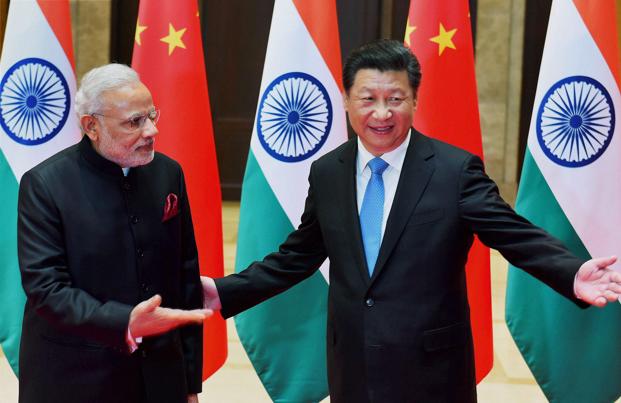
Despite India's boycott of BRF, China gears up for next summit

China said on Friday (April 19) it was ready to hold a Wuhan-style summit meeting with India this year to improve bilateral ties, notwithstanding India’s reported decision to boycott its 2nd Belt and Road Forum (BRF) to be held here next week to protest the sovereignty concerns over the China-Pakistan Economic Corridor (CPEC).
Addressing a media conference here ahead of the BRF being held from April 25-27 to showcase China’s trillion-dollar Belt and Road Initiative (BRI), Chinese foreign minister Wang Yi made an impassioned appeal to India to shed its opposition to the $60 billion CPEC, saying it no way ‘undermined’ basic position on the Kashmir dispute.
Asked if India’s reported decision to boycott the BRF would undermine the new momentum generated by last year’s informal summit between Prime Minister Narendra Modi and Chinese president Xi Jinping, Wang said the two leaders had a very successful meeting at Wuhan. “Particularly they have established mutual trust between the leadership and they jointly planned for the future of improvement and strengthening of China-India relations.
“After the Wuhan summit, we see all areas or progress between the two countries and we have bright prospect for this relationship. We are now preparing for the next summit of our leaders,” he said without specifying any time line.
Wang said so far 37 heads of state and governments had confirmed their participation in the BRF. Representatives from over 150 countries and 90 international organisations close to 5000 participants have confirmed their participation.
Leaders of Pakistan and Nepal are among the countries who would take part in the meeting. India has already signaled to boycott the BRF like it did in 2017 to highlight its objections over the CPEC.
India’s Ambassador to China Vikram Misri told Chinese state-run Global Times last month that “above all, connectivity initiatives must be pursued in a manner that respects sovereignty, equality and territorial integrity of nations. No country can participate in an initiative that ignores its core concerns on sovereignty and territorial integrity”.
On BRI
The BRI is a multi-billion-dollar initiative launched by President Xi when he came to power in 2013. It aims to link Southeast Asia, Central Asia, the Gulf region, Africa and Europe with a network of land and sea routes.
The CPEC which has been officially designated as a flagship project of the BRI, has become a stumbling block for India to take part in it as the controversial project is being laid through Pakistan-occupied Kashmir (PoK).
Xi’s visit
Xi plans to visit India for the 2nd such summit after the general elections, currently underway, are over. Wang said China and India were two major countries, besides being neighbors.
“It is natural for us to have differences. This is only natural. I remember Prime Minister Modi mentioning many times that we cannot escalate our differences into disputes. The Indian side wants to put our differences at a proper level in order not to interfere in the proper development of our relations,” he said.
“I believe this is in the fundamental interest of the people of the two countries and that is what China is happy to see,” he said.
“One of our differences is how to look at the BRI. The Indian side has their concerns. We understand that and that is why we have stated clearly on many occasions that the BRI including the CPEC is only an economic initiative and it does not target any third country and has nothing to do with the sovereign and territorial disputes left from history between any two countries,” he said.
Besides India’s protests over the CPEC, China’s doling out of huge sums of money specially to smaller countries raised concerns after Beijing acquired Sri Lanka’s strategic Hambantota port on a 99-year lease as a debt swap.
“India has its basic position on these disputes. Our cooperation will not undermine any party’s position on those issues,” Wang said, apparently suggesting that it would not alter even Pakistan’s position on the disputed status of the PoK.
China has been maintaining that Kashmir dispute is left over from history and it should be resolved between India and Pakistan. “Now we are trying to achieve common prosperity through the cooperation under the BRI. Those issues left over from history must be separated from our efforts in this area.
“I think such cooperation will not undermine your basic position on sovereignty and territorial integrity and at the same time provide you with more opportunities of development and help India in your modernization endeavor. I believe this is a good option and good choice for India,” Wang said.
US vice-president Mike Pence last year accused China of drowning smaller countries with heavy debt leading to the compromise of their sovereignty.
Asked whether the US is taking part in the 2nd BRF meet, Wang, while criticizing Washington’s stand, said America took part in the first BRF meet in 2017. “We welcome their participation. According to what we know American diplomats, local government and business leaders have confirmed their participation in the 2nd BRF,” Wang said. He said besides the US, France, Germany, the UK, Spain, Japan, South Korea and the EU will send high-level representatives to the forum. He said the total trade volume between China and the BRI participating countries had surpassed USD 6 trillion and investment exceeded USD 80 billion.


